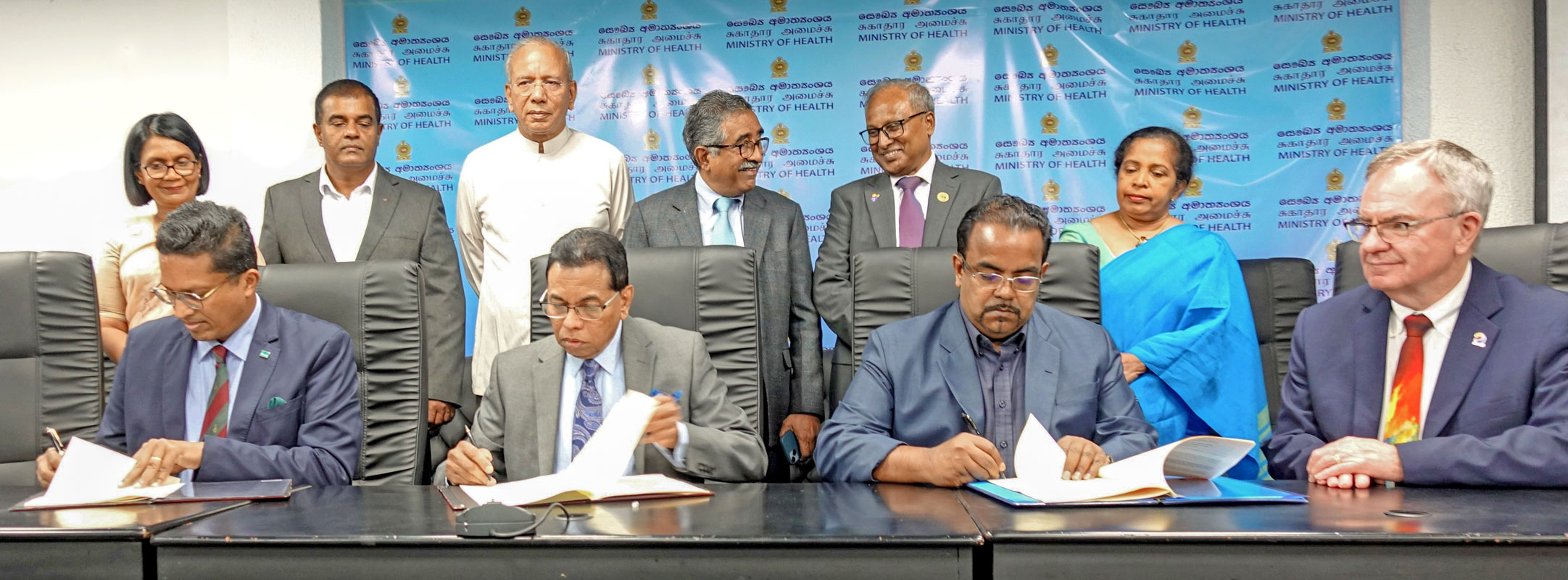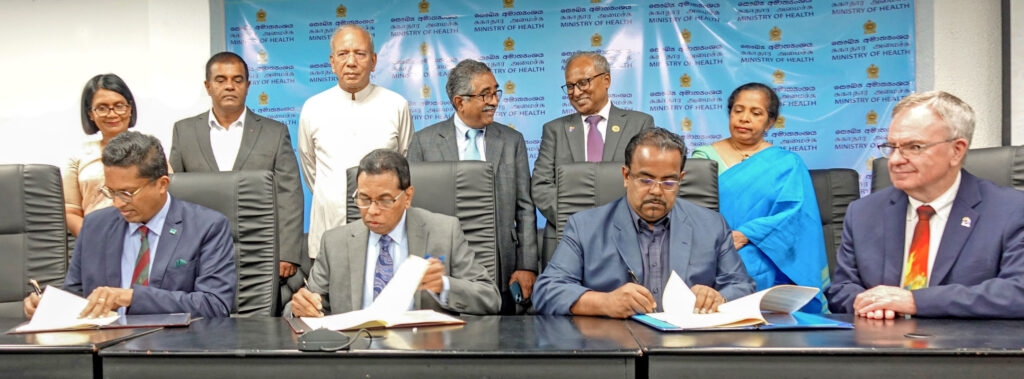
Imagine a world where whispers don’t turn into screams. Where tiny abnormalities are caught before they morph into monsters. This is the transformative power of early detection, especially for breast and cervical cancer. A mammogram could re-write your destiny. A test kit could detect the earliest stage of cervical cancer and hold the key to unlock a healthier future,” says PRIP K R Ravindran.
Cancer had stolen so many mothers, daughters and friends. This is the reality millions face each year, particularly when battling breast and cervical cancer.
Rotary Club of Colombo, Sri Lanka, RI District 3220, and the Rotary Club of Birmingham, Alabama, US, together with The Rotary Foundation refused to accept this situation as fate. Says Nirmali Samaratunga from RC Colombo, one of the key movers of the project: “Our Rotarians refused to let fear steal another life. That’s why we embarked on a mission, to detect these cancers early, when hope blooms brightest.”
Cancer steals so many mothers, daughters and friends. This is the reality millions face each year when battling breast and cervical cancer.
— PRIP K R Ravindran
Past president of the club Derek Wijeyaratne adds: “We set out to build not just an Early Detection Centre, but a bridge to a future where early intervention saves lives, where fear gives way to empowerment, and hope becomes the guiding star.”
A Rotary, government, TRF partnership
They set up a standalone facility with building and equipment completely dedicated for screening for early detection and prevention of cancer, and providing such services at no cost. The centre offers screening for early detection of breast, cervical and oral cancer.
In Sri Lanka breast cancer had the highest incidence amongst all cancers; this Rotary Centre offered a full-fledged breast cancer screening service with first an advanced digital mammography machine and later an ultrasound machine which became critical for detection and confirming diagnosis. Till now this centre has screened over 95,000 women, with over 25,000 detections of abnormalities requiring further investigation. All this free of cost.

This centre was so good that it became integrated into the country’s National Breast Cancer Screening Programme — a significant recognition of Rotary efforts by the government.
Samaratunga says, “Whenever we spoke about the Rotary Colombo project, we only used two sets of numbers; how many women had been screened, and how many had shown abnormalities requiring further investigation. Those numbers were the measure of our club’s success. The number of women with a positive screen was the number of women to whom we had at least given a better chance at a complete cure. But we soon realised that we needed to go further in our evaluation.”
Past president Tony Alles adds, “The screening process is only the first step in the cancer journey. After all, each positive screen was not really a success, but only the first step on a path, that no one really chooses to walk.”
Cervical cancer can be eliminated
Apart from breast cancer, in Sri Lanka each year, almost 1,500 women are diagnosed with cervical cancer; whilst the number of deaths from cervical cancer are over 700 each year.
Dr Edward Partridge, a cancer specialist from the Birmingham club, pointed out that almost all of that suffering could have been prevented, because cervical cancer is nearly always the result of the Human Papilloma Virus, known as HPV, and what’s more, it is the only cancer that has a vaccine. This makes it the only cancer that can be entirely prevented, thus opening up the possibility of complete elimination.
He explained that HPV vaccination in young girls protects them from the disease and HPV detection at screening identifies those women who may harbour a pre-cancer which can be treated early and prevented from becoming a full-blown cancer.
There was palpable excitement amongst the members of the Colombo Rotary when they learned this. “We realised that we could actually eliminate cervical cancer from our country,” said Alles.
So in theory, all that needed to be done was to vaccinate all girls in the age group 10–14, and screen women between 35 and 45 for the HPV virus. The vaccine gives lifetime immunity and the critical testing side-by-side enables the detection of the virus which might have already infected the women. Around 7 per cent of the women tested were found carrying the virus.
Full cost of vaccines funded
The government showed its commitment by agreeing to Rotary’s request of funding the full cost of vaccines; a huge win for Rotary! With this, the country achieved vaccination levels of over 90 per cent. Ed Partridge confirmed that these types of numbers were almost unheard of anywhere in the world.
Rotary gifted an advanced technology, Cobas 4800 HPV DNA machine, capable of testing for large numbers and identifying the high-risk virus strains which caused cervical cancer. This test which identified the cervical cancer-causing virus was very viable and doable, compared to the complexity of Pap smear programmes which often faced resistance and involved much longer time to get results.
The club also ran a countrywide comprehensive publicity programme to educate and create greater public awareness on the need for screening and the necessity for the early detection of cervical cancer.
RC Birmingham brought in their experts from the University of Alabama’s famous O’Neal Cancer Center to help build a training of trainer programme for public health personnel with emphasis on midwives. The midwife system in Sri Lanka is extremely effective. Midwives were the key communicators with the target group that needed to be screened.
Meanwhile, the government fulfilled its obligation of providing the vaccines.
Corporate partnership
However, disaster stuck in the form of the economic collapse of the government and it did not have the resources to supply the test kits as pledged after the stock provided by Rotary was over.
As Samaratunga points out, “vaccination by itself is not enough. It must go hand-in-hand with the screening and testing process to make a serious impact.”
It was a serious setback, but the Colombo Rotarians would not be deterred. They sought out and encouraged a corporate donor to fill the vacuum left by the government. The Dilmah Charitable Foundation stepped in. Together with Rotary and the government they would ensure the sustainability and continuity of the screening operation with a joint vision for Sri Lanka to be cervical cancer free by 2030.
The MoU
An MoU to formalise this partnership was signed on Jan 23 this year between the project partners with MJF (Dilmah) Charitable Foundation which pledged about SLR 75 million, the government committing an additional SLR 35 million and RC Colombo members donating another SLR 26 million to cement this partnership.
The goal of eliminating cervical cancer by 2030 was back on track!
The MoU was signed by Dilhan Fernando, chairman of Dilmah Tea, Migara Alwis, president, RC Colombo, and Dr P G Mahipala, Sri Lanka’s health secretary, in the presence of RI President Gordon McInally and RI director Raju Subramanian.
Rotary and their partners Dilmah Foundation and the government of Sri Lanka were writing a new chapter in the fight against breast and cervical cancer. Each mammogram, each child vaccinated, each woman tested meant possibly a life saved. It was a testament to the power of collective action with Rotary acting as the main catalyst.
Summing up the project, PRIP Ravindran says, “Rotary Colombo’s Cancer Early Detection Centre isn’t just a building; it’s a symbol of hope, a beacon of progress, and a testament to what Rotarians can accomplish. It shows what can be achieved by a club if only it has the sustained dedication of individual members, imaginative initiative of Rotary leaders, the sincere commitment of a club and a magnanimous, knowledgeable and hands-on partner like Rotary Birmingham. The icing on the cake is Dilmah coming on board; this represents the best of example of corporate leadership.”
Pictures by Rasheeda Bhagat
How Dilmah was brought on board
Speaking to Rotary News on his family foundation making such a big commitment of SLR 75 million for the first year towards the cause of eliminating cervical cancer from Sri Lanka, Dilma Tea chairman and CEO, the disarming and affable Dilhan Fernando said: “The business philosophy of my late father was that a minimum of 15 per cent of our pre-tax profits should go towards philanthropy.”
While he was walking with PRIP K R Ravindran recently, “he told me about this project and how it comprehensively addresses preventable and curable cervical cancer in Sri Lanka. He told me that while the government has given great support to this excellent project, competing priorities in a difficult economic situation in the country required help from other sources. When Ravi mentioned this to me, I felt this has to be corrected and I am so very happy that today we are signing the MoU with the government and Rotary.”
While this year his foundation has committed SLR 75 million for this project, “every year we will assess the work that has been done… just as we do in any business we undertake, and after that assessment, we will help accordingly in the next few years.”
He added that the Dilmah Charitable Foundation executes its charitable projects directly; “apart from this, we do 150 projects for children, women, housing, nutrition, etc. We have some 300 people in the field to execute these projects,” he said.
So is he a Rotarian? Dilhan smiles and says, “I was a Rotarian and member of RC Colombo Metropolitan, but I travel a lot and so got kicked out for lack of attendance! But now they have called to say there is no more insistence on attendance, so I plan to rejoin.”
While the corporate, the government and the Rotarians are committed to ensuring the sustainability and continuity of this project which hopes to eliminate cervical cancer from Sri Lanka by 2030, Ravindran, a close friend of Dilmah founder, the late Merrill J Fernando, says “Merrill’s philosophy was ‘Business is a matter of human service!’ As a trustee of their Foundation, I can tell you firsthand that they spend over $3 million per annum in their philanthropy efforts each year. Thanks to them, we at RC Colombo are happy that our goal of eliminating cervical cancer by 2030 is back on track!”









